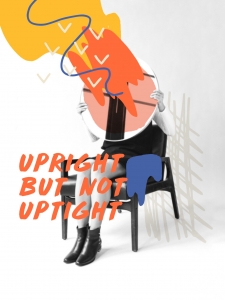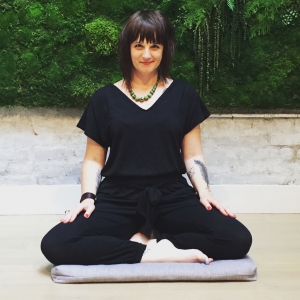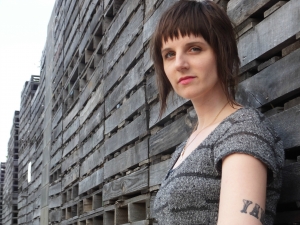Mindfulness Monday: Starting A Meditation Practice: Upright, But Not Uptight – Heather Demetrios
I wanted to write a post that had a Labor Day vibe, since this little missive of mine will go up on our (supposed) day of rest, and it works out nicely, since the next part of our discussion on starting a meditation practice is going to be on posture. But, since this is a blog for writers, I’m going to talk about how meditation posture relates to your writing process, as well: we call this killing two birds (but not actually killing them, since that would give the Dalai Lama a heart attack).
In meditation, we have a little saying about posture: “Be upright, but not uptight.” Meaning: have a dignified, regal pose, a nice elongated spine with the vertebrae nicely stacked, shoulders rolled back: but you’re not a ballerina, about to enter from stage left to dance Giselle. The goal is to achieve a posture that enables you to stay alert, but allows the mind to be relaxed. I hesitate to say that word—relaxed—because meditation isn’t about that. At least, not the kind we’re talking about. Mindfulness meditation is about waking up, about understanding how the mind works, about honing your curiosity. It’s not about checking out or chilling out. You might feel some relaxation doing it—a fringe benefit, but not the goal. So when I say the mind gets relaxed, I mean that you’re creating the ideal conditions through your posture and other elements to enable the mind to access the flow state.
For example, a more relaxed mind in meditation is able to acknowledge a thought when it arises, but then allow it to pass on by. An “uptight” mind, would grasp onto that thought, mindlessly going down the rabbit hole of whatever the mind is presenting (your To Do list for the do, or that juicy plot element). By being “upright but not uptight” we signal out bodies and minds that we’re entering into a space where diligent, good work is going to happen. Where we are going to make our best effort to be mindful, to work with the mind and not against it in order to access some of the clarity, focus, flow, creativity, equanimity, peace, and compassion that we’re hoping meditation will give us.
When we remain disciplined in our practice, constantly returning to the correct posture during our sit (as opposed to lazy slouching), we work that mindfulness muscle. So much of what we do in our lives is done on auto-pilot. By focusing on maintaining correct posture, we create the best conditions for our meditation to bear fruit. It’s the same with our writing. When we create the ideal conditions for our writing to flourish, it has a much better chance of doing so.
What do “upright but not uptight” look like in our process? It’s a balance, of discipline and relaxation, of holding on and letting go. It might look like sticking to your writing schedule (upright), but being gentle with yourself and calling it a day when a migraine comes on during your writing session (not uptight). It could be saying no to a social engagement you don’t really want to go to anyway so that you can write—and because you know you need to get serious about your writing practice (upright), but making space to fill your creative well through fun activities that enrich and color your life, alone and with others, even if it means losing a bit of writing time to do so (not uptight).
Take a few minutes to jot down some of your own upright / not uptight examples and think on where you might need more of one or the other. Do you lack discipline, and need more structure? Or are you too rigid, and could do with a bit of loosening up? Either way, sitting in meditation will help you see in a very clear and physical way this relationship between the two.
Labor Day is meant to be a day of rest from your work (though I know this is certainly not the case for all), and so I encourage you as you rest today and think on how you can bring more of this balance between upright and uptight into your process, and your life. Mindfulness and meditation, though work, are also an invitation to freedom from the kind of grueling—and often unnecessary—work we so often put ourselves through. There is lightness to be found when you sit down to write. So sit. Roll those shoulders back. Breathe.
If you’re curious about starting a meditation practice, I have a 7-Day Starter Kit for Writers that will help you begin the journey. As always, please feel free to reach out to me with any questions about your practice—all my contact info is in my bio.
Breathe. Write. Repeat.
Bio:
Heather Demetrios (’14) is a young adult author, writing coach, and meditation teacher for writers. She’s the recipient of the Susan P. Bloom PEN New England Award and the author of several critically acclaimed novels, including Bad Romance, I’ll Meet You There, and Exquisite Captive. She’s the editor of the upcoming anthology, Dear Heartbreak: YA Authors and Teens on the Dark Side of Love, which features several VCFA faculty and alumni, and the author of Codename Badass, an upcoming feminist pop biography of WWII spy, Virginia Hall. New fantasy, contemporary, and historical novels are also forthcoming from Macmillan. Her honors include books that have been named Bank Street Best Children’s Books, a YALSA Best Fiction For Young Adults selection, a Goodreads Choice Nominee, a Kirkus Best Book, and a Barnes and Noble Best Book. She lives abroad in various locales, but you can always find her at Mindfulness for Writers and on Instagram (@HDemetrios). Find out more about Heather and her books at www.heatherdemetrios.com.





